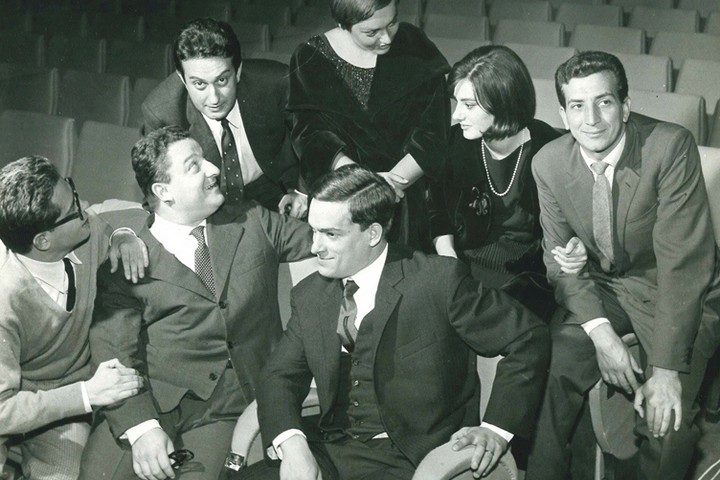Debutto: Genova, Sala Eleonora Duse, 6 dicembre 1962
| Traduzione | Giacomo Debenedetti |
| Riduzione | Giacomo Debenedetti Luigi Squarzina |
| Regia | Luigi Squarzina |
| Scene e costumi | Gianni Polidori |
| Musiche | Gino Negri |
| Produzione | Teatro Stabile di Genova |
Personaggi e interpreti
| L’Arcivescovo/contadino | Giorgio De Virgiliis |
| Servo/contadino | Orazio Meli |
| Colonnello Linehart/Barone Nossak | Arrigo Forti |
| Banchiere Foucre/il lebbroso | Raffaele Giangrande |
| Heinz/contadino | Emilio Cappuccio |
| Schimidt | Andrea Lala |
| Nasty | Antonio Battistella |
| Gerlach/contadino/il mendicante | Arnaldo Bagnasco |
| Donna | Margherita Guzzinati |
| Heinrich | Carlo D’Angelo |
| Capitano Ulrich/borghese | Sandro Rossi |
| Barone Rietschell/borghese | Luigi Carubbi |
| Contadina/borghese | Myria Selva |
| Contadino/borghese | Vittorio Penco |
| La maestra | Carla Bonavera |
| Contadino/borghese | Luigi Dameri |
| Contadina/la strega/borghese | Dina Braschi |
| Secondo novizio/borghese | Franco Carli |
| Il parroco/borghese | Adolfo Fenoglio |
| Il profeta/barone Schulheim | Giulio Brogi |
| Il vescovo/contadino | Gino Bardellini |
| Contadina/popolana | Nuccia Stancanelli |
| Contadino/popolano | Sandro Dori |
| Popolana | Chiara Delmonte |
| Franz/popolano | Carlo Formigoni |
| Contadina/popolana | Raffaella Rossi |
| Primo ufficiale | Michele Kalamera |
| Portantino/contadino | Alfredo Senarica |
| Hermann | Corrado Nardi |
| Goetz | Alberto Lionello |
| Caterina | Paola Mannoni |
| Contadino/secondo capo contadino | Giuliano Disperati |
| Karl | Omero Antonutti |
| Primo novizio | Giancarlo Fortunato |
| Tetzel | Eros Pagni |
| Hilda | Lucilla Morlacchi |
Con questa messinscena Squarzina compie una ardita operazione culturale di grande valore: invita la critica e il pubblico ad una prova di maturità di fronte ad un’opera teatrale che, vigente la censura, non avrebbero mai potuto vedere. Le opere di Sartre erano state messe all’indice già nel 1948. Ciononostante Squarzina lo rappresenta e ne spiega le motivazioni nelle accurate Note di regia. Ma portare in palcoscenico un mostro che predica il male assoluto e sentire gridare “Dio non esiste” sembrava inaudito nell’Italia del 1962. Succede il finimondo. Il sindaco democristiano viene attaccato dalla destra, dall’Azione cattolica e dalla Curia, molte le lettere minatorie o di diffida indirizzate a Ivo Chiesa e a Squarzina. Si chiede la chiusura del teatro e si invoca il ritorno alla censura. La situazione si sblocca grazie all’intervento del Cardinale Siri che dà il lasciapassare.
Le critiche al testo di Sartre continueranno numerose e pesantissime, ma lo spettacolo di Squarzina sarà giudicato mirabile, affascinante, con una grande potenza di regia ed una tensione che non cade mai, e riscuoterà uno straordinario successo di pubblico. Il protagonista Alberto Lionello, per l’interpretazione di Goetz, vince nel 1963 contemporaneamente il Premio Palermo, l’Anfora d’oro e il Premio San Genesio, prevalendo, per quest’ultimo, sul concorrente Tino Buazzelli per la sua interpretazione del Galileo, rappresentato da Strehler al Piccolo di Milano.
Si ringrazia il teatro Nazionale di Genova per la concessione dell’utilizzo del materiale fotografico.

